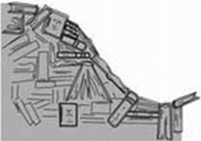It seems as if every industry has reevaluated itself lately. Many of these new assessments stem directly, or indirectly, as a consequence of the global COVID-19 pandemic. Book publishing is no exception, as experts, observers, and insiders have attempted to capture the state of production and readership trends across geographies and genres.
Much of what has been written focuses on the parts of book publishing that are really outside of CBQ’s sphere of influence—trade book publishing. This type of book publishing, recognized as one of the major seven types,Footnote1 reflects books that are most readily available at favorite bookstores, airport concessions, and public libraries. Trade books include popular bestsellers, literary works, and those titles highlighted by local and national book clubs. However, books that are the focus of CBQ’s reviewers fall into the category of “Academic Publishers.” Although there are not many studies that explore the specific contexts of these markets, it is useful to examine how prognosticators are viewing the entire field of publishing for insights about where we have been, and where we might be headed.
Where Publishing Has Been
Some data have suggested that the pandemic may have increased the overall appeal of books. One comprehensive study, coordinated with data from the Association of American Publishers (AAP), market researcher NPD Group, and Publishers Weekly magazine, delved into the effects of the COVID-19 pandemic on all aspects of the publishing industry.Footnote2 Some key observations:
Families and individuals in “stay-at-home” mode have rediscovered that reading provided a form of safe and relatively inexpensive escape or entertainment;
Publishers have been able to transition their staff fairly seamlessly from office to home;
Higher Ed publishers began to see that their long-term investments in digital products began to yield dividends, and colleges and universities pivoted to more online instructions;
Academic publishing on the whole has benefited from the attention that COVID-19 has placed on the value of science, research, and the ability to get new information out quickly.
The method of discovering new books, according to publishing expert Jane Friedman, has still relied upon tried-and-true methods of word-of-mouth and personal recommendation. But she notes that the pandemic has affected this in different ways, including highlighting the role of an author’s brand. Simultaneously, the process of discovering about books has become extremely varied, especially for Millennials, and includes a broader range of media, such as television, movies, and video games.Footnote3
Echoing the idea that the pandemic has placed a new spotlight on the value of research, another article suggests that this focus helped to accelerate the production of scholarly work, as evidenced by what it notes was an unprecedented surge in scholarly output. This bulge has also encouraged publishers to speed up access to publications through “preprint” and other strategies.Footnote4 Yet, this bounty has not been equally shared. Scholars have detailed the ways, for instance, in which the pandemic has unevenly inhibited scholarly production for women and caregivers. With fewer women producing articles and manuscripts, their work towards achieving tenure and other academic benchmarks may be hampered.Footnote5
Finally, although these studies emphasize the appeal of scientific studies as a result of the focus on the pandemic, there may be a parallel, increased focus on the cultural and social shifts that have been highlighted during our collective lockdowns. These would include social justice movements, environmental causes, and political schisms, to name a few.
In short, the COVID-19 pandemic will have left its indelible mark on global cultures and societies, including upon the publishing industry. In CBQ’s next “Currents,” we will take a look at what experts are saying about the future of publishing, beyond the pandemic.
Follow us on Twitter: @CBQ_Journal and continue the conversation.
Dr. Meta G. Carstarphen, APR, is CBQ Editor-in-Chief and is Gaylord Professor in Strategic Communication in the Gaylord College of Journalism and Mass Communication at the University of Oklahoma.
Notes
1 See Valerie Peterson’s “The 7 Types of Book Publishing Companies,” The Balance Careers, Nov. 30, 2019: https://www.thebalancecareers.com/types-of-book-publishers-2799865
2 See COVID-19 and Book Publishing: Impacts and Insights for 2021, by Cliff Guren, Thad McIlroy, & Steve Sieck, Jan. 5, 2021, (free download): https://thefutureofpublishing.com/new/wp-content/uploads/2021/01/COVID-19_and_Book_Publishing-FINAL.pdf
3 See Jane Friedman’s “How the Pandemic Is Affecting Book Publishing,” April 23, 2021, [blog post]: https://www.janefriedman.com/how-the-pandemic-is-affecting-book-publishing/
4 See “Scholarly Publishing in the Wake of COVID-19,” by Robert C. Miller and C. Jillian Tsai, in the International Journal of Radiation Oncology Biology & Physics, June 22, 2020: https://www.ncbi.nlm.nih.gov/pmc/articles/PMC7462968/
5 See “The Disproportionate Impact of the Pandemic on Women and Caregivers in Academic,” by Makala Skinner, Nicole Betancourt, & Christine Wolff-Eisenberg, ITHAKA S+R, March 31, 2021: https://sr.ithaka.org/publications/the-disproportionate-impact-of-the-pandemic-on-women-and-caregivers-in-academia/
 CBQ Currents Topical Essays About Contemporary Issues
CBQ Currents Topical Essays About Contemporary Issues